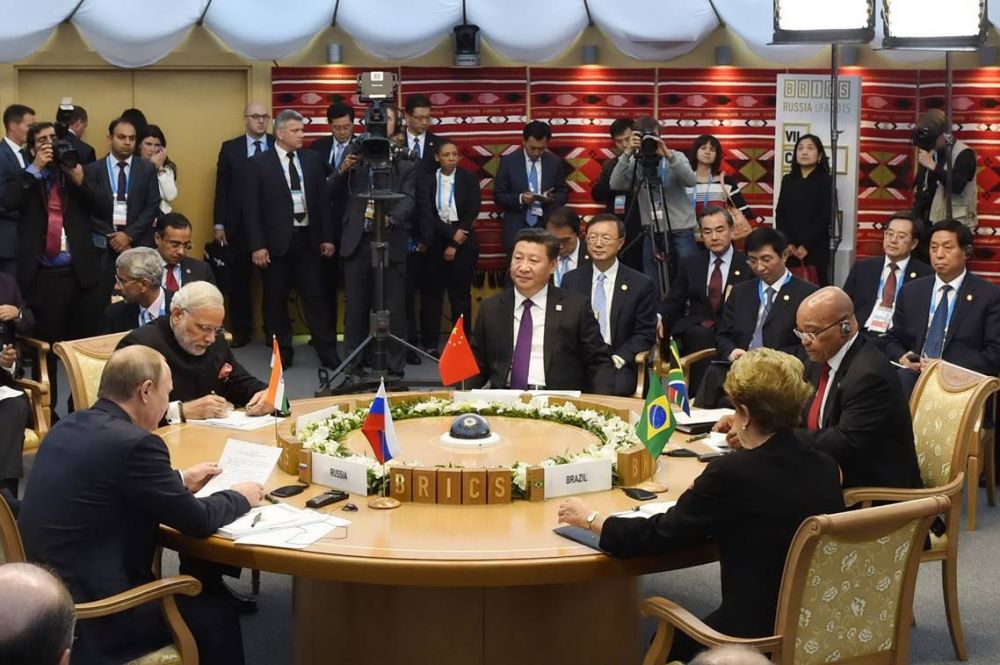BRICS, SCO summits strengthen cooperation

Chinese President Xi Jinping attends the seventh BRICS summit on July 9 with Russian President Vladimir Putin, Brazilian President Dilma Rousseff, Indian Prime Minister Narendra Modi and South African President Jacob Zuma. (PHOTO: XINHUA)
The simultaneous BRICS and Shanghai Cooperation Organization summits in Ufa, Russia, represent a milestone in strengthening cooperation within the BRICS and broadening the scope of the SCO, scholars said, commenting on the achievements made during the two conferences.
Chinese President Xi Jinping attended the seventh summit of the BRICS nations—Brazil, Russia, India, China and South Africa—from July 8 to 9 and the 15th meeting of the Council of Heads of State of the Shanghai Cooperation Organization from July 9 to 10, during which Xi shared views with about 20 counterparts on major international issues, such as global governance, peace and development.
Four-pronged partnership
In the wake of the financial crisis, the world economy has entered a period of profound readjustment characterized by instability and uncertainty. The BRICS members are also experiencing slower economic growth as well as developmental difficulties and challenges. This situation has raised doubts about whether cooperation is practicable in the long term.
In his keynote speech, Xi called on BRICS countries to build a partnership based on four tasks: safeguarding world peace, boosting common development, promoting diversified civilization and strengthening global economic governance.
"The four-pronged partnership has redefined relationships among the BRICS nations, presenting a new concept of international relations," said Li Wei, a research fellow from the National Academy of Development and Strategy at Renmin University of China.
The partnership China has proposed is aimed not at containing a third party but rather strengthening cooperation within the bloc itself, Li said. "China has established bilateral partnerships, and Xi’s four-pronged partnership under a multilateral framework offers a new approach to future cooperation for the BRICS nations."
In addition, BRICS nations signed a number of cooperation agreements.
Moreover, they agreed to form the New Development Bank and establish the BRICS Contingent Reserve Arrangement. The meeting approved the Strategy of BRICS Economic Partnership. The strategy lays out a roadmap for further economic and trade cooperation while stressing cooperation in eight key fields, including trade investment, manufacturing, energy and finance.
In addition to economic cooperation, the declaration issued at the meeting included agreements on major global agendas, such as the post-2015 development agenda, climate change negotiations, IMF reforms, and opposition to fascism and militarism.
"These efforts convey to the international community the clear-cut position of major emerging powers, the determination of the BRICS nations to strengthen cooperation and the great potential in this aspect," said Chen Zhimin, director of the School of International Relations and Public Affairs at Fudan University. The meeting highlighted the significant role of the BRICS in global development, he said.
Membership expansion
Since its establishment in 2001, the SCO has been committed to strengthening strategic cooperation, solidarity and mutual trust. It has evolved into a major platform for safeguarding security, maintaining stability and promoting common development in the region.
The Ufa summit initiated a process to include India and Pakistan as full members of the SCO, marking a breakthrough in SCO membership expansion. "The acceptance of new members is necessary for any international organization to develop and grow," said Sun Zhuangzhi, secretary-general of the Center for SCO Studies at the Chinese Academy of Social Sciences. "The accession of India and Pakistan to the SCO will broaden the areas of cooperation and present more choices, injecting vitality to its development."
Sun said the inclusion of two former adversaries is a manifestation of the charisma of the "Shanghai Spirit" of mutual trust, mutual benefit, equality, consultation, respect for cultural diversity and pursuit of common development. "Unlike other regional mechanisms led by Western countries, the SCO opposes neo-interventionism and advocates the settlement of disputes through political and diplomatic means rather than military means."
The Ufa summit also adopted the SCO Development Strategy until 2025. In addition to security, the document presents a blueprint for the bloc’s cooperation in various fields, such as politics, economics and humanities in the next decade, Sun said. "Though it focused on security cooperation at the very start, the SCO has gone far beyond the area of security," he said, "The second decade is a crucial period for the SCO to develop mechanisms and implement projects. In particular, economic cooperation is the material basis, and success in this respect is the key to the balanced development and lasting cohesion of the SCO."
Mao Li is a reporter at the Chinese Social Sciences Today.
